American Troops Posed With Taliban Corpses
The consequences of ten years of war?
The L.A. Times is out today with another story about questionable behavior by American troops in Afghanistan that’s likely to further inflame tensions between the U.S. and the Afghan population:
The paratroopers had their assignment: Check out reports that Afghan police had recovered the mangled remains of an insurgent suicide bomber. Try to get iris scans and fingerprints for identification.
The 82nd Airborne Division soldiers arrived at the police station in Afghanistan’s Zabol province in February 2010. They inspected the body parts. Then the mission turned macabre: The paratroopers posed for photos next to Afghan police, grinning while some held — and others squatted beside — the corpse’s severed legs.
A few months later, the same platoon was dispatched to investigate the remains of three insurgents who Afghan police said had accidentally blown themselves up. After obtaining a few fingerprints, they posed next to the remains, again grinning and mugging for photograph
Two soldiers posed holding a dead man’s hand with the middle finger raised. A soldier leaned over the bearded corpse while clutching the man’s hand. Someone placed an unofficial platoon patch reading “Zombie Hunter” next to other remains and took a picture.
The Army launched a criminal investigation after the Los Angeles Times showed officials copies of the photos, which recently were given to the paper by a soldier from the division.
“It is a violation of Army standards to pose with corpses for photographs outside of officially sanctioned purposes,” said George Wright, an Army spokesman. “Such actions fall short of what we expect of our uniformed service members in deployed areas.”
Wright said that after the investigation, the Army would “take appropriate action” against those involved. Most of the soldiers in the photos have been identified, said Lt. Col. Margaret Kageleiry, an Army spokeswoman.
The photos have emerged at a particularly sensitive moment for U.S.-Afghan relations. In January, a video appeared on the Internet showing four U.S. Marines urinating on Afghan corpses. In February, the inadvertent burning of copies of the Koran at a U.S. base triggered riots that left 30 dead and led to the deaths of six Americans. In March, a U.S. Army sergeant went on a nighttime shooting rampage in two Afghan villages, killing 17.
We’ve seen incidents like this before, of course, and it is at least a good thing that once they’ve been brought to light the military has been fairly aggressive about prosecuting the offenders. At the same time, one has to wonder why it took some two years, and a solider willing to leak the photographs, for this to come to light. The crime is bad enough, obviously, but as we learned from Abu Gharib, the cover-up of activities that demean the statute of the military and endanger American troops is certainly not a good thing. So, in addition to identifying who was involved in these macabre photographs, it would be fairly interesting to find out who may have known about the photographs and chosen to hide them rather than bringing the offenders to justice.
The other question, of course, is what impact this will have in Afghanistan itself. We’ve already seen the nation erupt into riots this year over the burning of Korans by American troops, so it wouldn’t be to far out of line to expect something to happen in retaliation for this action. At the same time, though, it’s worth noting that we didn’t really see any major retaliation for the massacre that took place last month, something that nearly everyone seemed to be expecting at the time. In any case, though, this episode, finally revealed after two years , does show us one thing. A decade at war has led to a disturbing ethos in some parts of the military, one that some in the upper echelons seemed to, if not endorse at least agree to keep quiet about. With Iraq over and Afghanistan winding down, I certainly hope that someone in Washington is thinking about what role this new wartime military will play in peacetime.
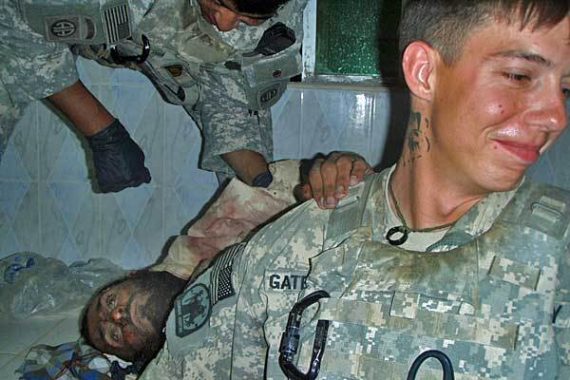

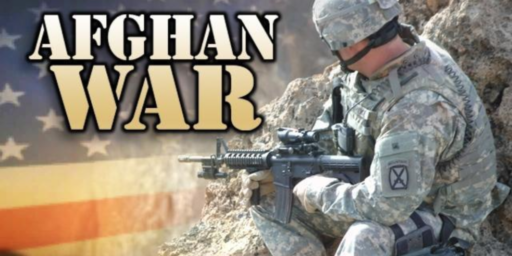
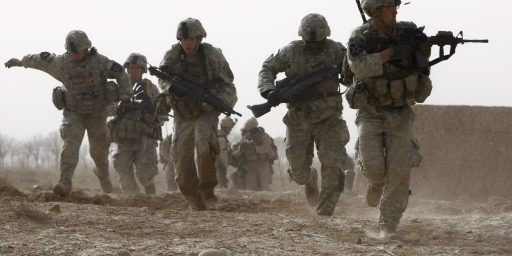
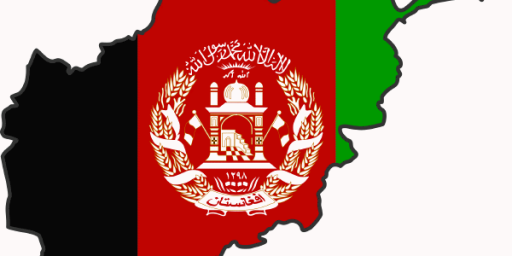

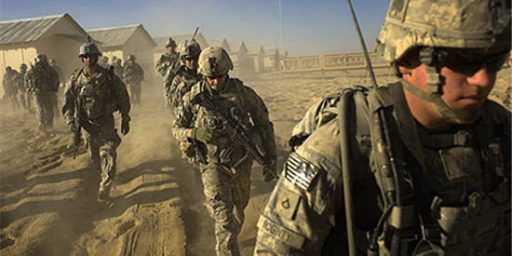
Atrocities such as this are the usual result of sending young men into combat. Killing other people is an unnatural activity; it is not suprising that the mind convinces itself that the enemey is a mere abstract, not an actual human being. Is this twisted? Sure. The difference these days is the digital record. Events that occured on the battlefield used to stay there, in a murky cloud of memory, even when the soldiers return stateside. Now they can be multiplied and transmitted around the world in seconds. Eventually, it comes out.
Perhaps people will realize what combat actually produces.
@John Peabody:
I don’t know, John.
Yes you’re right that combat does sometimes have that effect on men, and there are more than enough examples from history to back you up there. At the same time, I have to doubt that this kind of thing would’ve been tolerated in General Eisenhower’s Army.
@Doug Mataconis:
This is a dangerously anacronistic argument that help’s prop up “The Greatest Generation” myth.
My father-in-law served in Eisenhower’s army. And he shared with me a number of stories of crimes committed against German POWs. One story, in particular, involved a petty CO who went from soldier to soldier looking for someone to escort captured prisoners to camp and “be back in 5 minutes.” Camp was often a 30 minute walk — this was code to go into the woods and execute surrendered prisoners (less paperwork and let the company keep marching).
The key difference here (beyond the fact that Eisenhower’s Army was a fighting versus occupying force, with entirely different stresses) is that personal media technology was such that no one could easily take or circulate these sort of pictures. And so, we mistake the lack of documentation for proof that this sort of thing didn’t happen.
I agree with your point about the stress that this has had on our soldiers. But this sort of thing has gone on since the beginning of time when it comes to war.
Have to agree that this has gone on forever. I suspect it was clamped down on earlier in our occupations. As things have dragged on with no end in sight, discipline has let up. Time to go.
Steve
@steve: I agree, the only thing that is different is lots of cameras and the internet.
@mattb:
Fair point. Perhaps I was letting nostalgia get in the way of good judgment
Hell, soldiers in WWII sent the skulls of Japanese soldiers home to loved ones as souvenirs. I’m not going to try and rank that against taking pictures with corpses on the atrocities scale, but clearly Eisenhowers army was not a crusading band of angels.
@Doug Mataconis: Eh, we all want to believe things used to be better.
I mean, I have a hard time believing healthy young people think this could be funny enough to warrant photos. Then again, I have an aggravating number of friends obsessed with taking photos of everything.
Then there is this…
http://images.search.yahoo.com/images/view?back=http%3A%2F%2Fsearch.yahoo.com%2Fsearch%3Fei%3DUTF-8%26p%3Dlt%2Bcalley&w=124&h=160&imgurl=www.bing.com%2Fimages%2Fsearch%3Fq%3Dlt%2Bcalley%23focal%3D828bb4083d1b141d7269f08211beae1c%26furl%3Dhttp%253a%252f%252fwww.georgelois.com%252fimages%252fEsquire%252520covers%252fesquire_calley.jpg&size=&name=search&rcurl=http%3A%2F%2Fwww.bing.com%2Fimages%2Fsearch%3Fq%3Dlt%2Bcalley%23focal%3D828bb4083d1b141d7269f08211beae1c%26furl%3Dhttp%253a%252f%252fwww.georgelois.com%252fimages%252fEsquire%252520covers%252fesquire_calley.jpg&rurl=http%3A%2F%2Fwww.bing.com%2Fimages%2Fsearch%3Fq%3Dlt%2Bcalley%23focal%3D828bb4083d1b141d7269f08211beae1c%26furl%3Dhttp%253a%252f%252fwww.georgelois.com%252fimages%252fEsquire%252520covers%252fesquire_calley.jpg&p=lt+calley&type=&no=2&tt=115&oid=http%3A%2F%2Fts1.mm.bing.net%2Fimages%2Fthumbnail.aspx%3Fq%3D4785427318309032%26id%3D55c27c10af1e9c5e0a46072e534b9725&tit=Lt.+Calley&sigr=15c2g0c30&sigi=1553ecdve&sigb=11jt2oqe6&fr=aaplw
@Doug Mataconis:
I totally understand why you would want to think that. I think Tillman nailed it, it that we all want to believe things were better. On the flip side, it also means that typically things are not as bad as we think they are either.
Frankly, with the pervasiveness of recording tools, I sometimes find it surprising that we haven’t had even more reports of this sort of stuff.
Of course, part of the problem may, in fact, stem from the reality that we are essentially fighting this war with contract laborers. They may bring different attitudes to the situation than conscriptees did in the past. In addition, the degree to which our society is inured to violence may be playing a role.
@ Doug: “With Iraq over and Afghanistan winding down, I certainly hope that someone in Washington is thinking about what role this new wartime military will play in peacetime.”
Again, since this “new wartime military” is essentially a contract labor force, they can merely be downsized. And hey, didn’t the way we handled the Vietnam vets work out ok–on the whole, of course?
I’ve only recently come across the stories about atrocities in WWII. Chilled my blood, but considering how the war was fought — deliberate dehumanization of the enemy (both German and Japanese) from the highest levels — it shouldn’t have come as a surprise.
Frankly, I think we’re doing better than previous wars. It’s still not at the ideal level, of course. Those soldiers are in serious trouble; it makes it worse that they’re in an Elite unit.
And this is (but one reason) why war should be an absolute last resort, and should be concluded as quickly as possible (which, in turn, means not handing your army a ridiculous fantasy mission like “make Afghanistan a functional country”).
[This incident is minor in comparison to the guy who went rouge and was whacking Afghan civilians. And other such incidents. Posing with dead enemy combatants is bad behavior, but to me it pales in comparison to murder. This is not an excuse for the behavior.]
to paraphrase the late Sen. George Aiken, a Vermont Republican, who opposed the War in Vietnam, “Declare victory and go home.”
LOL @ me. Rogue, not rouge. Maybe I should have a “do not post before caffeine kicks in” rule.
@John D’Geek:
The coarsening effect of war applies to society as a whole as well. By the end of WWII we were vaporizing entire cities with barely a second thought. If someone at the beginning of the were had proposed burning down all of Dresden, they would have been considered a barbarian.
It would certainly be interesting to know more about the role of the 82nd in Afghanistan, the psychological impact on their soldiers being a part of a group that has been in Afghanistan from the start, and the culture that may have formed as a result. Anecdotally, I saw photographs much like this at the start of the war in Afghanistan, from someone in the 82nd actually (which I know is huge), so this isn’t new in any way.
My questions would be, what do we do about it? Can anything be done about it, when we send young men who are not completely developed psychologically into high stress situations? Is there some larger strategy that can be implemented to lessen things like this? I am not saying I have the answers, but there are cultures that form as a result of war, within military units, and a wider understanding of these issues might help us develop a military where instances like this not only happen less, but when they do we not only discipline but help the soldiers involved.
I would be interested in any thoughts on long term changes that help mitigate the stresses of combat on soldiers, and what a military that plans for and works on these issues might look like.